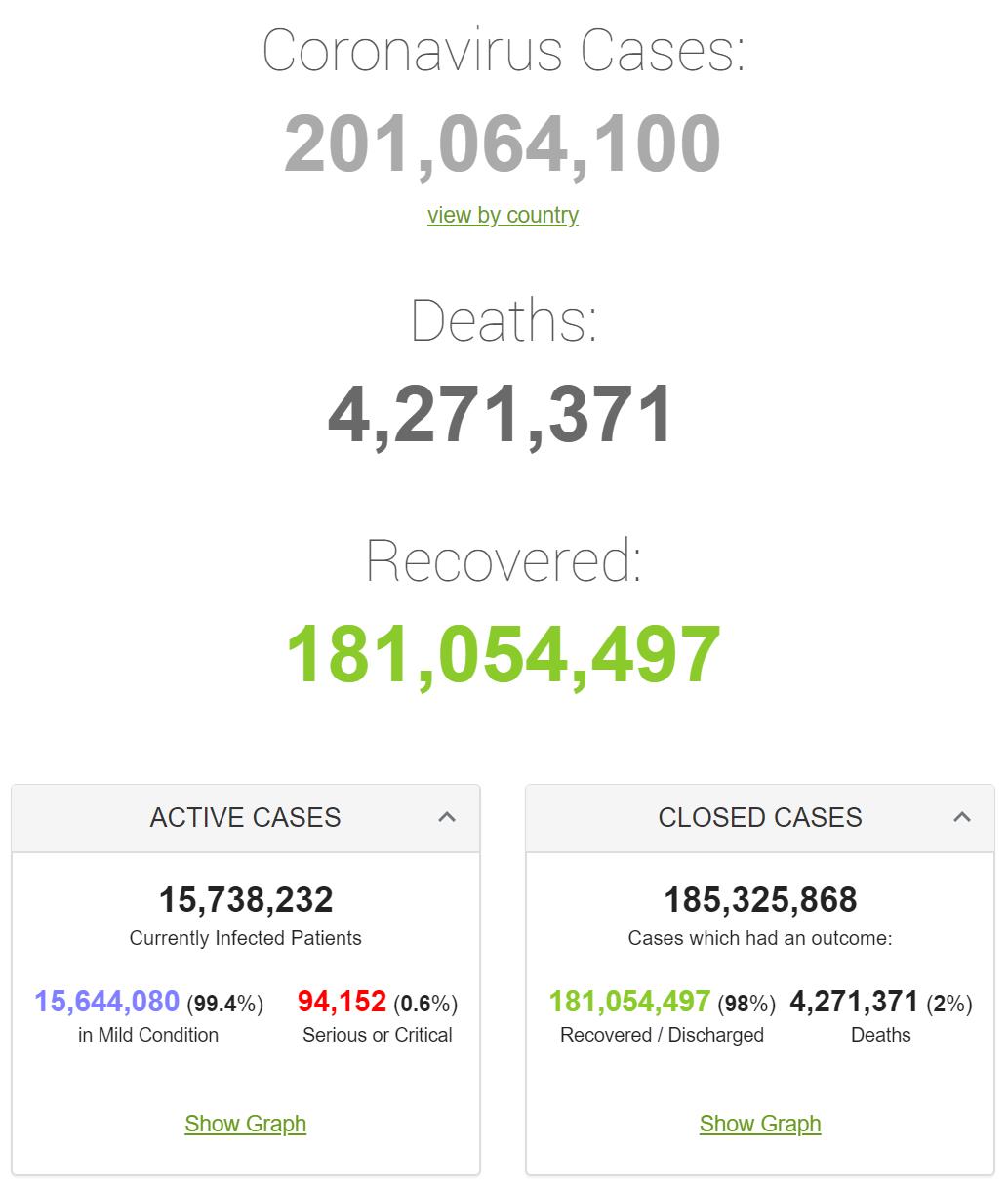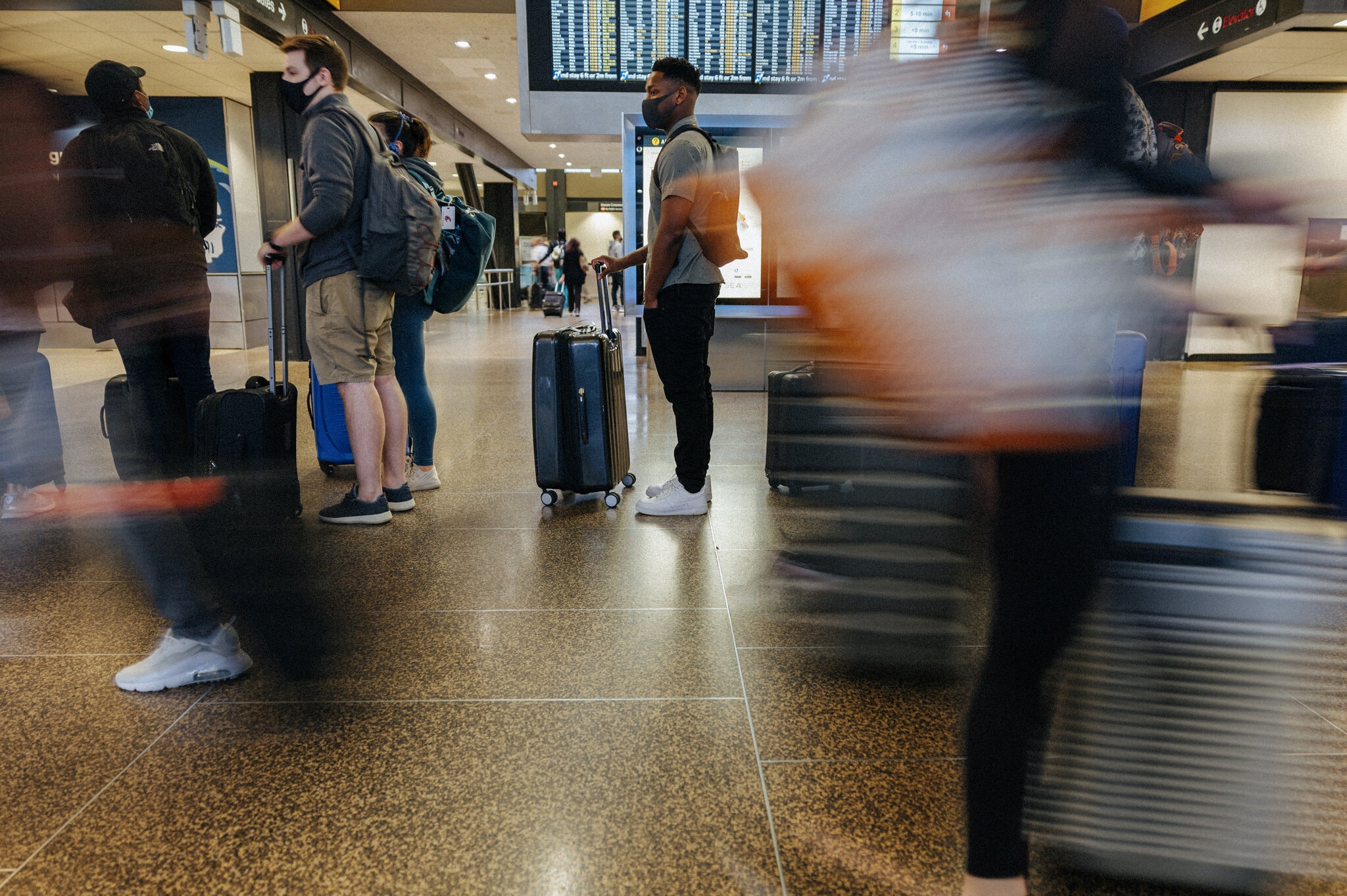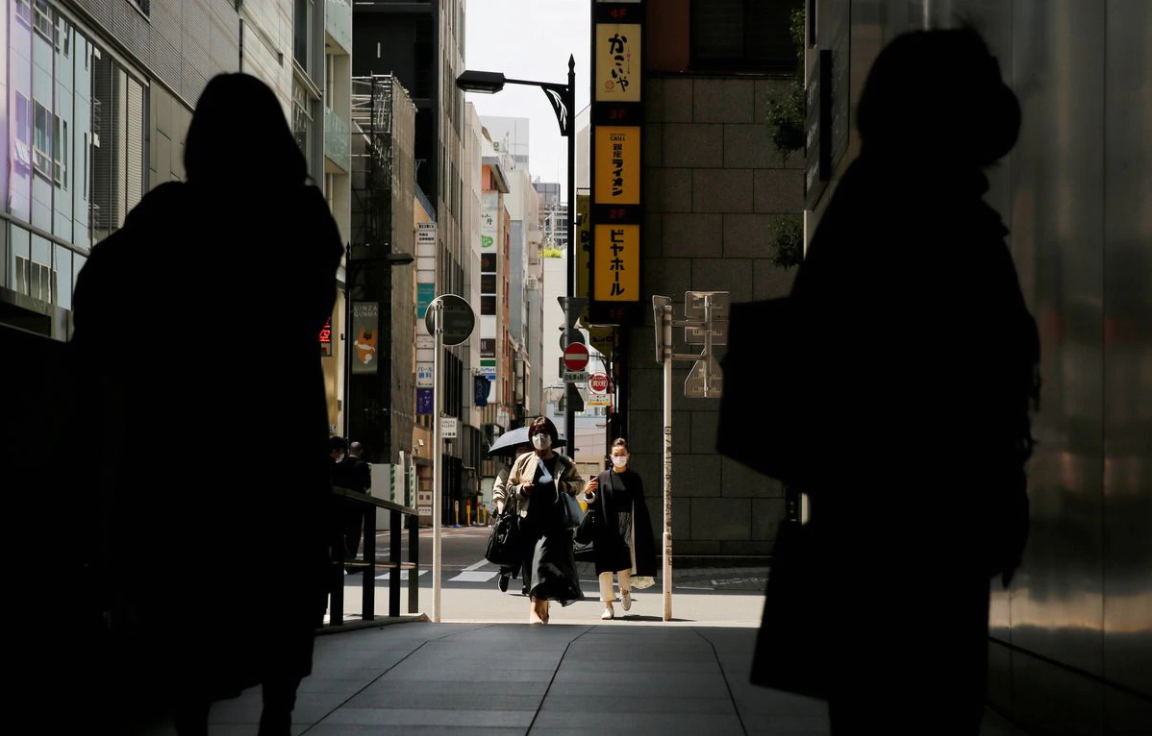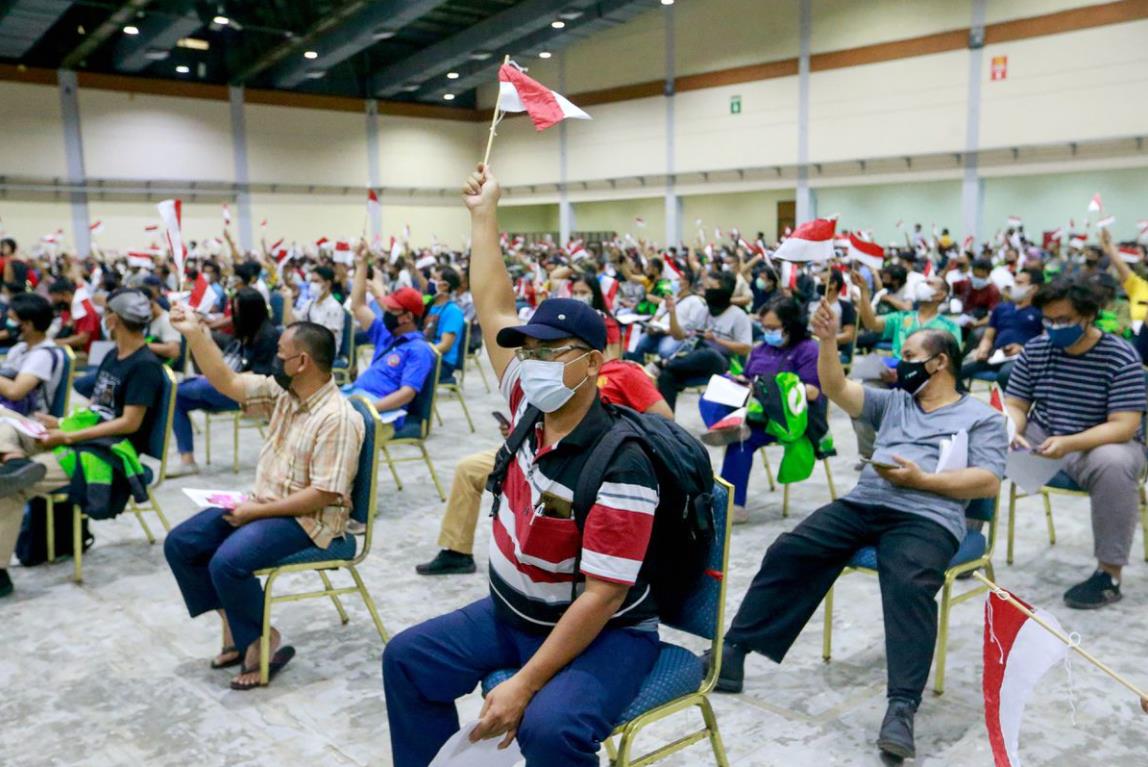
 i_need_contribute
i_need_contribute


|
Country, |
Total |
New |
Total |
|
Other |
Cases |
Cases |
Deaths |
|
World |
200,936,451 |
683,851 |
4,269,042 |
|
USA |
36,176,471 |
112,279 |
631,299 |
|
India |
31,810,782 |
42,817 |
426,321 |
|
Brazil |
20,026,533 |
40,460 |
559,715 |
|
Russia |
6,356,784 |
22,589 |
161,715 |
|
France |
6,207,416 |
28,784 |
112,046 |
|
UK |
5,952,756 |
29,312 |
130,000 |
|
Turkey |
5,822,487 |
26,822 |
51,767 |
|
Argentina |
4,975,616 |
13,736 |
106,747 |
|
Colombia |
4,815,063 |
7,084 |
121,695 |
|
Spain |
4,545,184 |
21,874 |
81,844 |
|
Italy |
4,369,964 |
6,596 |
128,136 |
|
Iran |
4,019,084 |
39,357 |
92,194 |
|
Germany |
3,785,981 |
3,655 |
92,240 |
|
Indonesia |
3,532,567 |
35,867 |
100,636 |
|
Poland |
2,883,448 |
164 |
75,269 |
|
Mexico |
2,880,409 |
18,911 |
241,936 |
|
South Africa |
2,484,009 |
13,263 |
73,415 |
|
Ukraine |
2,255,345 |
984 |
53,024 |
|
Peru |
2,119,068 |
2,416 |
196,673 |
|
Netherlands |
1,874,856 |
2,763 |
17,839 |
|
Czechia |
1,674,183 |
237 |
30,372 |
|
Iraq |
1,673,084 |
12,713 |
18,938 |
|
Philippines |
1,619,824 |
7,342 |
28,231 |
|
Chile |
1,619,183 |
726 |
35,671 |
|
Canada |
1,434,737 |
955 |
26,618 |
|
Bangladesh |
1,309,910 |
13,817 |
21,638 |
|
Malaysia |
1,183,110 |
19,819 |
9,855 |
|
Belgium |
1,130,758 |
1740 |
25,251 |
|
Sweden |
1,102,829 |
|
14,620 |
|
Romania |
1,083,982 |
271 |
34,298 |
|
Pakistan |
1,047,999 |
4,722 |
23,575 |
|
Portugal |
977,406 |
3,203 |
17,412 |
|
Japan |
956,407 |
12,076 |
15,219 |
|
Israel |
885,766 |
2,968 |
6,503 |
|
Hungary |
809,731 |
59 |
30,032 |
|
Jordan |
774,554 |
897 |
10,082 |
|
Serbia |
723,518 |
487 |
7,129 |
|
Switzerland |
721,776 |
1,033 |
10,908 |
|
Nepal |
705,072 |
2,975 |
9,957 |
|
UAE |
686,981 |
1,519 |
1,965 |
|
Thailand |
672,385 |
20,200 |
5,503 |
|
Austria |
660,854 |
592 |
10,744 |
|
Morocco |
653,286 |
10,603 |
10,015 |
|
Kazakhstan |
602,952 |
7,519 |
6,277 |
|
Tunisia |
599,594 |
2,819 |
20,410 |
|
Lebanon |
565,896 |
1,542 |
7,921 |
|
Saudi Arabia |
529,995 |
1,043 |
8,284 |
|
Greece |
503,885 |
2,855 |
12,988 |
|
Ecuador |
489,089 |
1,387 |
31,694 |
|
Bolivia |
475,265 |
727 |
17,882 |
|
Paraguay |
453,794 |
427 |
15,172 |
|
Belarus |
449,302 |
965 |
3,494 |
|
Panama |
438,781 |
1,037 |
6,860 |
|
Georgia |
432,903 |
4,233 |
5,948 |
|
Bulgaria |
426,432 |
429 |
18,229 |
|
Cuba |
422,614 |
9,363 |
3,091 |
|
Costa Rica |
412,918 |
1,795 |
5,087 |
|
Kuwait |
400,979 |
851 |
2,351 |
|
Slovakia |
392,845 |
94 |
12,541 |
|
Uruguay |
381,994 |
141 |
5,979 |
|
Guatemala |
377,446 |
4,399 |
10,524 |
|
Croatia |
364,244 |
271 |
8,267 |
|
Azerbaijan |
346,878 |
996 |
5,039 |
|
Dominican Republic |
343,186 |
336 |
3,971 |
|
Denmark |
320,222 |
927 |
2,550 |
|
Sri Lanka |
318,775 |
2,556 |
4,727 |
|
Palestine |
317,404 |
140 |
3,609 |
|
Myanmar |
315,118 |
4,051 |
10,695 |
|
Venezuela |
309,218 |
766 |
3,649 |
|
Ireland |
305,527 |
1,217 |
5,044 |
|
Honduras |
301,700 |
1128 |
7,962 |
|
Oman |
297,724 |
293 |
3,889 |
|
Egypt |
284,472 |
57 |
16,550 |
|
Lithuania |
284,191 |
503 |
4,422 |
|
Ethiopia |
281,811 |
511 |
4,403 |
|
Bahrain |
269,617 |
122 |
1,384 |
|
Libya |
260,951 |
2484 |
3,635 |
|
Moldova |
260,024 |
196 |
6266 |
|
Slovenia |
259,625 |
139 |
4,429 |
|
Armenia |
230,993 |
280 |
4,625 |
|
Qatar |
226,874 |
164 |
601 |
|
Kenya |
206,691 |
1,335 |
4,025 |
|
Bosnia and Herzegovina |
205,949 |
124 |
9,689 |
|
S. Korea |
203,926 |
1,723 |
2,106 |
|
Zambia |
197,791 |
668 |
3,430 |
|
Vietnam |
177,813 |
7623 |
2,327 |
|
Algeria |
176,724 |
1495 |
4,404 |
|
Nigeria |
176,011 |
747 |
2,167 |
|
Mongolia |
168,673 |
1444 |
833 |
|
Kyrgyzstan |
166,236 |
696 |
2,363 |
|
North Macedonia |
156,707 |
164 |
5497 |
|
Afghanistan |
149,361 |
428 |
6,864 |
|
Norway |
139,218 |
478 |
804 |
|
Latvia |
139,134 |
97 |
2,558 |
|
Estonia |
134,221 |
244 |
1273 |
|
Albania |
133,310 |
99 |
2457 |
|
Uzbekistan |
132,901 |
923 |
901 |
|
Mozambique |
127,425 |
1034 |
1526 |
|
Namibia |
119,984 |
187 |
3,112 |
|
Botswana |
115,220 |
|
1,653 |
|
25,614 |
65 |
657 |
Retrieved from: https://www.worldometers.info/coronavirus/
By Marc Santora and Isabella Kwai

A 1,800-bed field hospital was set up inside a cargo building in Don Mueang International Airport in Bangkok, Thailand, last week.Credit...Sakchai Lalit/Associated Press
The known total of global coronavirus infections surpassed 200 million on Wednesday, according to the Center for Systems Science and Engineering at Johns Hopkins University, a daunting figure that also fails to capture howdeeply the virus has embedded itself within humanity.
The official tally stands at more than 614,000 deaths in the United States. More than 550,000 in Brazil. More than 425,000 in India. Mexico has recorded more than 240,000 fatalities, and Peru nearly 200,000. Britain, Colombia, France, Italy, and Russia have all recorded well north of 100,000 deaths. The global toll as of Wednesday was 4.2 million, itself a rough estimate given the discrepancies in the way nations record Covid-19 deaths.
As the coronavirus continues to find new hosts across the planet, the emergence of the Delta variant — thought to be twice as infectious as the initial form of the virus — is adding fuel to a fire that has never stopped raging. Fully vaccinated people are protected against the worst outcomes of Covid-19 caused by the Delta variant.
Some countries, such as Australia, once had success keeping case counts low thanks to geographic isolation and strict lockdown measures. But that may not be possible with the Delta variant; Australia’s largest city, Sydney, is scheduled to be under lockdown until at least Aug. 28 as it tackles a continuing Delta outbreak. And governments have faced increasingly angry protests while enforcing lockdowns on weary populations and struggling businesses, and imposing new vaccine requirements.
Over the last six months — as the world raced to 200 million cases in half the time it took to reach 100 million — the calculus for measuring the danger of the moment has become more nuanced.
In Spain and Britain, where vaccine supplies are ample, cases have begun declining after the Delta variant drove numbers to concerning heights. But in other countries like Malaysia and Thailand, where doses are more scarce, that climb is continuing.
In the United States, with about 93 million people eligible for shots who have chosen not to get them, experts say that a rise in cases this winter is inevitable.
Public health officials are confident that there is little evidence to suggest that the virus has found a way to escape the main goal of vaccines: preventing serious sickness and death.
But there is also agreement that hundreds of millions of cases are now an inescapable part of our world of seven billion people. And with dramatic gaps in vaccination between wealthier and poorer nations, there is the extra challenge of funneling doses to those who remain unprotected. The W.H.O. on Wednesday called for a moratorium on booster shots until the end of September in an effort to help all countries inoculate 10 percent of their populations.
“We have to understand that this virus is now endemic,” said Robert West, a professor emeritus of health psychology at University College London, “and that we have to be thinking about our long-term strategies for dealing with it as a global phenomenon.”.
By Katie Rogers

Travelers wait in a bag drop line in the ticketing area at Seattle-Tacoma International Airport in May.Credit...Lindsey Wasson for The New York Times
The Biden administration is developing plans to require all foreign travelers to the United States to be vaccinated against Covid-19, with limited exceptions, according to an administration official with knowledge of the developing policy.
The plan, first reported by Reuters, will be part of a new system to be put in place after the current restrictions on travel into the country are lifted, but officials have yet to determine when that might be done.
President Biden has been under pressure for months to ease restrictions on people wishing to travel to the United States, particularly as other countries, including England, Scotland and Canada, relax their own measures.
But White House officials have said in recent days that there is no plan to lift current restrictions anytime soon, in light of the spread of the highly contagious Delta variant.
“Given where we are today,” Jen Psaki, the White House press secretary, told reporters last week, “with the Delta variant, we will maintain existing travel restrictions at this point.”
That stance was reiterated on Wednesday evening by White House officials who said that there was no timetable yet for requiring foreign travelers to be inoculated.
“The interagency working groups are working to develop a plan for a consistent and safe international travel policy, in order to have a new system ready for when we can reopen travel,” the administration official, who was not authorized to publicly detail the plan, wrote in an email. “This includes a phased approach that over time will mean, with limited exceptions, that foreign nationals traveling to the United States (from all countries) need to be fully vaccinated.”
Travelers from Iran, China, Brazil, the United Kingdom, South Africa, India, the Republic of Ireland and Europe’s Schengen area — spanning 29 countries, city-states and micro-states — are currently barred from entering the United States, according to the Centers for Disease Control, unless they are a U.S. citizen or they spend 14 days before arrival in a country that is not on that list.
The United States began restricting travel by foreigners in January 2020, when former President Donald Trump cut off some travel from China in the hope of preventing the spread of the virus. That effort largely failed.
But health officials pressed the Trump administration to expand travel bans to much of Europe during the first surge of the pandemic in the spring of 2020, and more countries have been added to the ban as the original virus and several variants have spread rapidly from country to country.
This week, the Biden administration said that it would keep in place Title 42, a public health rule that allows the government to turn back people attempting to enter the United States from its southern border.
The decision, confirmed by the Centers for Disease Control and Prevention on Monday, amounted to a shift by the administration, which had been working on plans to begin lifting the rule this summer, more than a year after it was imposed by the Trump administration.
Retrieved from: https://www.nytimes.com/live/2021/08/04/world/covid-delta-variant-vaccine
By Ami MiyazakiLinda Sieg

Pedestrians wearing protective face masks make their way at a shopping district on the first day of the country's third state of emergency, amid the coronavirus disease (COVID-19) outbreak, in Tokyo, Japan, April 25, 2021. REUTERS/Kim Kyung-Hoon
Japan decided on Thursday to expand its COVID-19 emergency restrictions to cover more than 70% of the population, as a surge in cases strains the medical system in the Olympics host city Tokyo and elsewhere.
Coronavirus infections are rising faster than ever as new cases hit record highs in Tokyo, overshadowing the July 23-Aug. 8 Olympics and fuelling doubts over Prime Minister Yoshihide Suga's handling of the pandemic.
Suga announced the new steps as new daily cases in Tokyo were set to top 5,000 for the first time and advisors to the capital said the figure could double in two weeks at the current rate, NHK public TV reported
"New infections are rising at an unprecedentedly fast pace," Economy Minister Yasutoshi Nishimura told a panel of experts, where he proposed "quasi-emergency" steps for eight more of Japan's 47 prefectures.
"The situation on the ground (at hospitals) is extremely severe," Nishimura added, noting that serious cases had doubled in the past two weeks.
The panel signed off on the proposal, but Nishimura told a news conference some members had warned the situation was severe enough to require a nationwide state of emergency - a stance shared by the head of the Japan Medical Association.
Six prefectures including Tokyo are already under full states of emergency to last through Aug. 31. Another five are under less strict directives, meaning just over half the population is covered by some restrictions.
The latest steps, to take effect from Sunday, mean that more than 70% of the population will be under some form of restriction. Criticism of Suga, his ratings already at record lows, is growing over his handling of the pandemic.
BACKLASH OVER HOSPITAL POLICY
The government says the Olympics has not caused the latest surge but experts say holding the Games now has sent a mixed message to an already weary public about the need to stay home.
Games organisers on Thursday reported 31 new Games-related COVID-19 cases, bringing the total since July 1 to 353.
It remains to be seen whether the latest COVID-19 restrictions, which are mostly voluntary, will have much impact as the highly transmissible Delta variant spreads.
"I do not think that more (quasi-emergency steps) will make much difference - (it's) simply a political statement," said Kenji Shibuya, former director of the Institute for Population Health at King's College London.
The latest expansion follows a sharp backlash against Suga's plan to limit hospitalisation of COVID-19 patients to those who are seriously ill and those at risk of becoming so, while others are told to isolate at home.
The shift is intended to address a hospital bed crunch, but critics say it will lead to an increase in deaths since the condition of patients can worsen rapidly.
In response to calls from within and outside his ruling coalition to reverse the policy, Suga told reporters on Wednesday that the change was aimed at regions with a surge in COVID-19 cases, such as Tokyo, and was not nationally uniform.
On Thursday, he appeared to backpedal further, saying moderately ill patients in need of oxygen treatment would be admitted to hospital.
The backlash is a fresh blow to the premier ahead of a ruling party leadership race and general election later this year.
Just under 31% of residents of Japan are fully vaccinated. With 15,221 deaths recorded as of Wednesday, the COVID-19 mortality rate was about 1.6%, in line with the United States.
Retrieved from: https://www.reuters.com/world/asia-pacific/japan-proposes-expanding-covid-19-emergency-curbs-cases-surge-says-minister-2021-08-05/
By Kate LambStanley Widianto

People raise the Indonesian flags during a mass vaccination program at the Jakarta Convention Center building in Jakarta, Indonesia, July 31, 2021. REUTERS/Ajeng Dinar Ulfiana
The COVID-19 death rate for people in the Indonesian capital of Jakarta who were not vaccinated was more than three times higher than those who were, according to new health ministry data.
The mortality rate of those who were not vaccinated was 15.5% compared with 4.1% for those who had received two shots of either the Sinovac (SVA.O) or AstraZeneca (AZN.L) vaccine, according to data from state hospitals and almost 68,000 patients in Jakarta from May to July.
The Southeast Asian country has been overwhelmed in recent months by a rapid spike in coronavirus cases, and on Wednesday it passed a grim milestone, recording a total of more than 100,000 deaths from COVID-19. L4N2PB231
Global data on vaccinated versus unvaccinated deaths is not easily available but Dr Ines Atmosukarto, a molecular biologist who works on vaccine development, said the data was further evidence of the importance of vaccination.
"This supports the proposition that two doses of vaccines reduces the chance of dying for those infected and requiring hospitalisation,” she said, adding that the data lacked detail about the age, comorbidity and period of observation of the patients.
Separately, data from the town of Banyuwangi on Java island, showed that 93% of COVID patients who died from March to July were not vaccinated, while 6% percent had received a first dose, and 1% had been fully vaccinated.
Sinovac and AstraZeneca vaccines were also the vaccines predominately administered in that area.
Siti Nadia Tarmizi, a senior health ministry official, said the data could help combat vaccine hesitancy in Indonesia.
In Indonesia, 18% of the population have had one dose of a vaccine, while 8% are fully vaccinated, according to health ministry data. Indonesia has had 100,600 deaths.
By comparison, in India 27.7% of the population have had one dose of a vaccine and 7.8 % are fully vaccinated, according to according to government data and research by Reuters. India has had 425,700 deaths.
Grappling with the spread of the highly transmissible Delta variant that was first identified in India, Indonesia has quickly become Asia’s coronavirus epicentre, now recording more than 3.5 million cases in total since the start of the pandemic.
But as cases have begun to drop in Jakarta and some areas on Java, with the health minister saying this week the country has reached the peak of its second wave, concerns remain that Delta could still ravage far-flung regions ill-equipped to handle a health crisis.
Irma Hidayana, a public health expert and co-founder of independent data initiative Lapor COVID-19 said that vaccine distribution issues, including infrastructure and data, as well as vaccine hesitancy, had hampered the government’s vaccine rollout.
“The ministry of health needs to have well planned vaccine distribution that ensures all vulnerable people are top priority,” she said, “The government must ensure that vaccines are evenly and equally distributed.”
Retrieved from: https://www.reuters.com/world/asia-pacific/indonesia-finds-covid-deaths-more-than-three-times-higher-unvaccinated-2021-08-05/

An update to Victoria’s Covid restrictions has been announced as Melbourne enters its sixth lockdown. Check the new rules on mask wearing, travel limits, and gatherings with our guide Photograph: Anadolu Agency/Getty Images
Australia’s second most populous state, Victoria, will go into a seven-day lockdown from 8pm on Thursday – the state’s sixth lockdown since the coronavirus pandemic began, my colleague Calla Wahlquist reports.
The premier, Daniel Andrews, announced the lockdown in response to two new mystery cases, including one cluster which is linked to Melbourne’s Al-Taqwa College and has grown to four cases.
The lockdown will apply statewide and follow the same rules as the last lockdown, which ended a week ago.
Andrews said he had no alternative but to introduce the lockdown as soon as unlinked cases had been detected in the community.
There are no alternatives to lockdown. If you wait, it will spread. And once it spreads, you can never even hope to run alongside it let alone get out in front of it and bring it back down to zero or a low number of cases. This thing moves so fast.
Speaking on Thursday afternoon, the premier said Victoria would be “locked down until Christmas, locked down until we get 80% of people through the vaccination program” if outbreaks were not contained quickly.
We don’t have enough people that have been vaccinated, and therefore, this is the only option available to us. Once people are vaccinated, then we have many more options to the question about whether there are other things you could do.
Earlier on Thursday, Andrews said “the government’s priority is to avoid what’s going on in Sydney”, which suffered its worst day of the pandemic on Wednesday with 262 cases recorded and five deaths.
That’s it from me today, I’m handing over to my UK colleague Lucy Campbell.
Here’s a roundup of what’s been happening over the past 24 hours:
· In Japan, some members of a government expert panel have warned that a recent surge in Covid-19 cases was severe enough to impose a nationwide state of emergency. But economy minister Yasutoshi Nishimura, who is in charge of the pandemic response, said the panel ultimately agreed to a government proposal to expand emergency restrictions to eight more prefectures.
· In Australia, New South Wales, home to Sydney, has suffered its worst day of the pandemic so far. The state reported 262 new cases, the majority in the country’s biggest city, and five deaths.
· The US has disputed calls by the WHO to delay Covid-19 vaccine booster shots to allow distribution to poorer countries, with White House spokesperson Jen Psaki calling it a “false choice”.
· Future travellers to the US will have to be fully vaccinated a White House official has said. The new requirement is being discussed as part of a phased approach to easing restrictions for foreign visitors.
· Millions of Britons have been given the green light to travel to Europe’s holiday hotspots, avoiding quarantine on return from France and Spain where concerns have been raised about Covid variants. The announcement was part of wider changes to travel rules for people travelling in and out of the UK.
· Mental health services suffered across the whole of Europe because of pandemic restrictions. New pan-European research shows that psychiatric services were reduced to emergency care only in many countries.
· The boss of one of the UK’s largest insurance firms has suggested that employers in London’s financial district may be struggling more than those in other cities to persuade office workers to return to their desks as coronavirus restrictions ease. Nigel Wilson, chief executive of Legal & General, said there were “a lot fewer people working in the City” compared with urban centres across the UK, Europe and the US.
· Vaccinating older teenagers has been welcomed by many scientists as the “logical next step” in the rollout of the vaccine. But some experts believe more research is needed before extending the programme further. Prof Russell Viner, professor of child and adolescent health at UCL, said more safety data is needed “before we consider vaccinating younger teenagers”.
· These comments followed the news earlier today that the UK will be offering 16 and 17 year olds a first dose of the coronavirus vaccine. The Joint Committee on Vaccination and Immunisation (JCVI) said its decision had been made after ‘large changes’ in the way that Covid has been spreading in the UK, “particularly in younger age groups”.
Retrieved from: https://www.theguardian.com/world/live/2021/aug/05/coronavirus-live-news-japan-experts-urge-nationwide-state-of-emergency-as-sydney-suffers-worst-pandemic-day